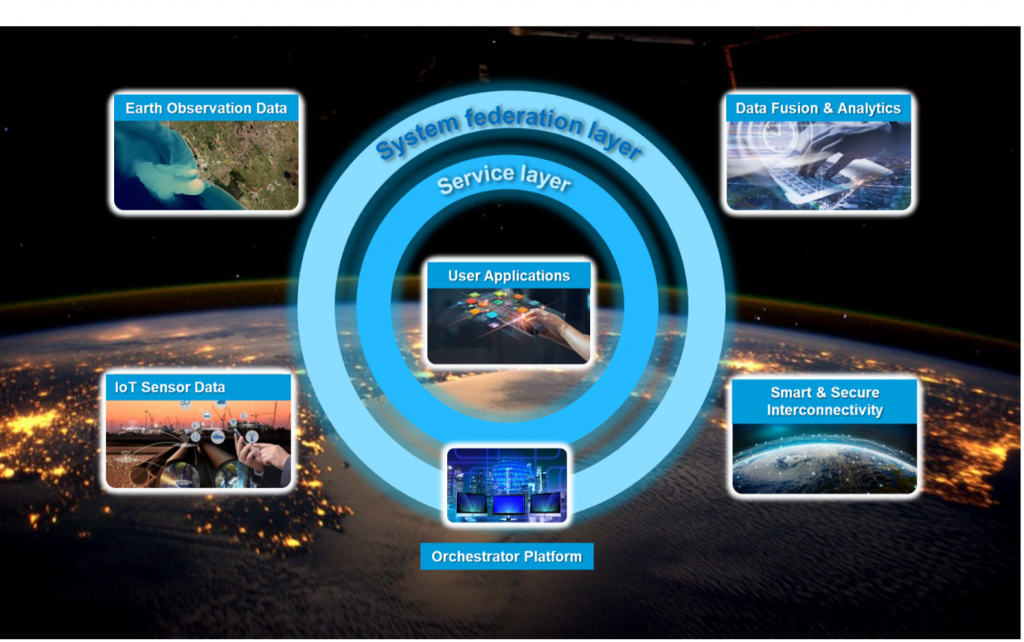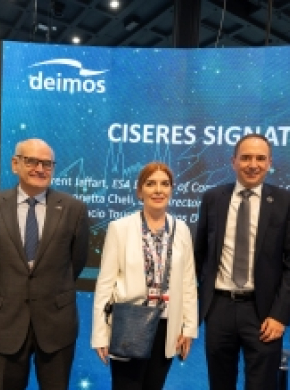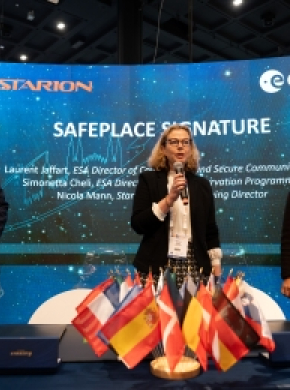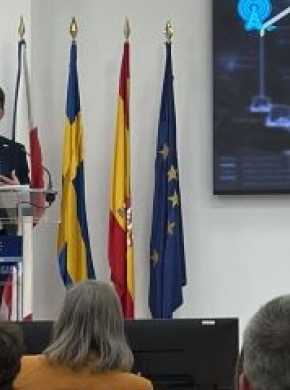Why is it necessary?
Europe is facing increasingly significant challenges to cope with humanitarian crises, climate change, cybercrime, and geopolitical instability. The World Economic Forum’s 2021 Global Risks Report puts extreme weather events and cybersecurity failures as the third and fourth most clear and present dangers to the world, ahead of any other economic, environmental or geopolitical risks. We need to act swiftly to further protect Europe’s citizens and institutions, and support critical infrastructures. With this in mind, ESA together with ESA Member states have elaborated on a need for a European flagship programme for ‘Civil Security from Space’ (CSS).
What exactly is it?
‘Civil Security from Space’ (CSS) is proposed to be a federated solution interconnecting space and ground systems and services, existing, planned and future. Such a solution allows to gather, process and provide information in real time to facilitate decision-making, and enables connectivity between first responders and their control centres. To this end, the initiative is composed of various elements including Earth observation systems, space-based positioning and navigation, enhanced telecommunication system and Internet of Things (IoT) resources. It will make use of secured satellite communications systems and terrestrial networks, and aims to leverage on disruptive technologies such as Artificial Intelligence (AI).
CSS brings together a unified, seamless, and secure multi-layer system for the protection of Europe’s citizens and Member States. It combines public and private assets, government and commercial interests, and leverages on current and future space and ground systems and services. Including multiple stakeholders, it serves our industry, Member States as well as wider European and international institutions and organisations. It is a fully scalable and interoperable system that aligns Europe’s space assets and its investments in next-gen and future space-ground hybrid architectures.

Use cases
Major use cases include civil protection, protection and deployment of critical infrastructures, traffic control, border surveillance, maritime safety, and humanitarian aid.
Aligning ESA TIA and European ambitions
ESA’s directorate of Telecommunications and Integrated Applications (TIA) champions this new multi-disciplinary activity that aligns ESA and European stakeholder needs, to propel the integration of Europe’s competencies and assets into monitoring, mitigating and resolving civil security and crisis events. It is an element of ESA’s Agenda 2025, and a major vector towards ESA’s Rapid Resilient Crisis Response Accelerator. We are working on the standardisation of technologies and elaborating on a milestone concept with optional modules which will help create exponential benefits at each stage of the Research and Development (R&D) and in-orbit validation and in-orbit demonstration (IOV/IOD) phases. ‘Civil Security from Space’ will thus generate significant additional return on investment for European industries and institutions.
CSS also supports the strategic independence and autonomy of Europe in communications, as well as in data and information handling in a digital world economy, and increases Europe’s lead in Earth observation systems. This enables Europe to bolster its role as a global leader in humanitarian action and to ensure its autonomy in essential resources.
CSS Objectives
Crisis events require a fast and resilient response, when seconds matter in events such as floods or fires and when availability, reliability, integrity and confidentiality are essential for trusted information and communications, (e.g., civil protection, emergency response, financial transactions). In times of crisis, users, be they civil security, health professionals, security, emergency or economic actors, commonly operate in areas where the ground-based infrastructures are not accessible or have been damaged by the crisis. Those users rely on space assets in anticipating action prior to events, assessing the situation during crisis, communicating and positioning in the field. Access to actionable information is key for effective prevention and intervention, to act quickly and resolve the crisis and minimise its impact.
In response to the above, the CSS objectives are to:
- Deliver a faster response – Ubiquitous data availability anywhere and in real-time, through global space-ground integrated state of the art communication systems
- Ensure resilient and reliable data – Trusted data with implicit confidentiality and availability, offered through secure networking and reliable cloud computing
- Generate actionable information – Smart gathering and intelligent processing of data from a multiplicity of sources in space and on ground for a holistic situation awareness in times of crisis, enabled via distributed and networked AI-based edge computing offering data fusion capabilities
- Take action – Autonomous and pro-active response to crisis events for the mitigation, support and resolution of unfolding events, enabled through the seamless integration and orchestration of crisis response systems and services.
The benefits of swift action are broad reaching and offer a high return, while the cost of slow action, or worse, no action, presents far-reaching implications, including a diminished ability to protect life and critical assets which are the backbone of our sustainable prosperity.
Core Solution elements
- Earth Observation sources – To gather new valued data from space
- IoT system & sensors - To capture new in-situ data from air/ground
- Interconnectivity – To rapidly transfer the information where and when needed
- Orchestrator Platforms – To federate and operate the system
- Data Fusion and Analytics processing centres – To derive valued information
- Service & Application Platforms – For flexible and efficient user interface and control
RFI Objectives and Planning
The Request for Information (RFI) is planned to provide guidance to a future programme which would have the overall objective to develop and validate the aforementioned set of inter-connected technical capabilities, and together with service providers and users conduct pre-operational verification of applications and services for civil security and crisis situations. The objective is to conduct the R&D and IOVIOD in a timeframe which would allow stakeholders to make use of the results and deploy their early services by 2025, leveraging on available assets augmented with new data fusion and system orchestration capabilities. This will be followed by new system elements including space segments, upgraded with innovations and further in-orbit demonstrations and validations of new enhanced capabilities by 2027. The capabilities would then be operated and exploited by institutional and commercial service providers in the different stakeholder and use case environments.
To support the progressive evolution of the solution and to simultaneously leverage on current available or under plan systems, the implementation of the programme will be phased. The phases are such that they enable the rapid R&D and IOD/IOV of a solution that can stimulate early services by service providers and operators to stakeholders by 2025.

Industry Response
Request for Information in support of ‘Civil Security from Space’
If interested, please request and respond to our Request for Information in support of preparations for an ESA programme on ‘Civil Security from Space’. The industrial response to this RFI may be considered in a related programme proposal by ESA to its Member States for their contributions at the occasion of the November Council Meeting at Ministerial level ‘CM22’. All are welcome to apply.
The RFI Call is now Closed.
NEWS AND EVENTS
The European Space Agency (ESA) and the International Committee of the Red Cross (ICRC) have signed a Memorandum of Intent (MoI) to collaborate on supporting the development and increased use of space-enabled solutions.
ESA bolsters Estonian and Baltic emergency response
ESA’s Civil Security from Space programme is working to support governments in the event of large-scale civilian evacuations, ensuring authorities are equipped and prepared in times of crisis.
ESA’s Smart-Connect expands to drive disaster response capabilities from space
ESA’s Smart-Connect project, as part of ESA’s Civil Security from Space (CSS) programme, is expanding its capabilities in meeting the challenges faced when terrestrial telecommunications channels are disrupted during…
ESA to leverage AI-enabled satellite for disaster response
ESA is using the ever-increasing capabilities of artificial intelligence (AI) to enhance Europe’s ability to respond more effectively and quickly to civil security and disaster situations.
ESA to enhance space-enabled crisis management with Safeplace
ESA, in partnership with a Starion-led industrial consortium, launched a project to develop a new space-enabled service for crisis response.
European Space Agency introduces industry-driven partnership for resilient connectivity during…
The European Space Agency (ESA) has launched a new partnership with an industrial consortium through a project called Smart-Connect, which aims to mitigate the challenges presented when existing telecommunication channels are…
Experts meet in Madrid to define new Space Data Space
As the impact of geopolitical tensions and climate change challenges continue to be felt around the world, key players in Europe’s space sector came together in Spain last week to define the requirements of a future Space Data Space system for…
Civil Security From Space Industry Day
Europe is facing increasingly significant challenges to cope with humanitarian crises, climate change, cybercrime, and geopolitical instability. The World Economic Forum’s 2021 Global Risks Report puts extreme weather events and cybersecurity…
NOW CLOSED: RFI Call for Civil Security from Space - A Necessity for Europe
‘Civil Security from Space’ is proposed to be a federated solution interconnecting space and ground systems and services, existing, planned and future.










